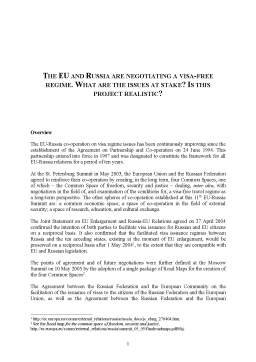Extras din referat
The EU-Russia co-operation on visa regime issues has been continuously improving since the establishment of the Agreement on Partnership and Co-operation on 24 June 1994. This partnership entered into force in 1997 and was designated to constitute the framework for all EU-Russia relations for a period of ten years.
At the St. Petersburg Summit in May 2003, the European Union and the Russian Federation agreed to reinforce their co-operation by creating, in the long term, four Common Spaces, one of which – the Common Space of freedom, security and justice – dealing, inter alia, with negotiations in the field of, and examination of the conditions for, a visa-free travel regime as a long-term perspective. The other spheres of co-operation established at this 11th EU-Russia Summit are: a common economic space; a space of co-operation in the field of external security; a space of research, education, and cultural exchange.
The Joint Statement on EU Enlargement and Russia-EU Relations agreed on 27 April 2004 confirmed the intention of both parties to facilitate visa issuance for Russian and EU citizens on a reciprocal basis. It also confirmed that the facilitated visa issuance regimes between Russia and the ten acceding states, existing at the moment of EU enlargement, would be preserved on a reciprocal basis after 1 May 2004 , to the extent that they are compatible with EU and Russian legislation.
The points of agreement and of future negotiations were further defined at the Moscow Summit on 10 May 2005 by the adoption of a single package of Road Maps for the creation of the four Common Spaces .
The Agreement between the Russian Federation and the European Community on the facilitation of the issuance of visas to the citizens of the Russian Federation and the European Union, as well as the Agreement between the Russian Federation and the European Community on readmission were eventually signed this year at the 17th EU-Russia Summit, held at Sochi on 25 May.
Latest developments
The most important step towards the implementation of a visa-free regime is obviously the signing of the Agreement on the facilitation of the issuance of visas at the last EU-Russia Summit. This stage had been prepared under the British Presidency of the EU Council, at the EU-Russia Summit in London, on 5 October 2005. President Barroso of the European Commission presented with this occasion the common positions on visa facilitation and readmission as a concrete example of the progresses made in the rapprochement between the two political powers:
“Our close friendship with Russia is taking another important step forward. We will start implementation of the four common spaces which will further strengthen our relationship. Agreements on visa facilitation and readmission will be a very important example of the concrete benefits that the European Union – Russia relationship can bring to our citizens” .
The two agreements have been signed under the Austrian Presidency , in the vision that they will open the way for easier contacts across the European continent, while creating conditions for effectively fighting illegal immigration.
The EU-Russia agreement on visa facilitation provides for substantial measure intended to ease the issuance of short-stay visas:
- reduction of the decision delivery time: in principle, for all visa applicants, the decision on whether or not to issue a visa will have to be taken within 10 calendar days;
- simplification of the requested documents for some categories of persons (close relatives, business people, members of official delegations, students, participants in scientific, cultural and sporting events, journalists etc.);
- reduction of the visa fees by aligning them to the Schengen visa fee, and exemption for close relatives, officials participating in government activities, students, persons participating in cultural and educational exchange programmes or sporting events and humanitarian cases;
- simplified criteria for issuing multiple-entry visas for members of national and regional governments and parliaments, Constitutional and Supreme Courts and their spouses and children, as well as for members of official delegations, business people, participants in scientific, cultural and sporting events, journalists and drivers and train crews etc.
- holders of diplomatic passports are exempted from the visa requirement for short stays.
The scope of the smoothing the way of delivering ordinary visa is an intended stay of no more than 90 days per period of 180 days. As the UK and Ireland do not participate in the EU
Preview document
Conținut arhivă zip
- Regimul vizelor intre UE si Rusia.doc

















